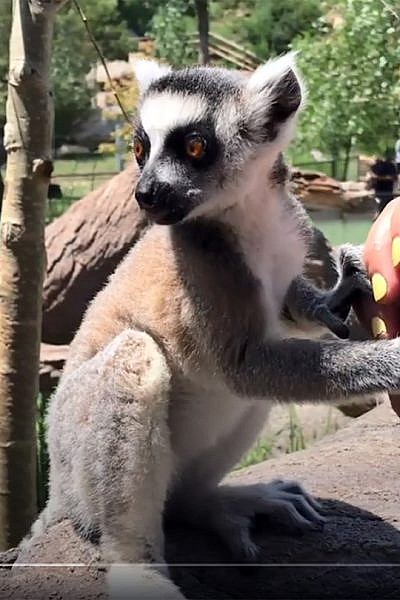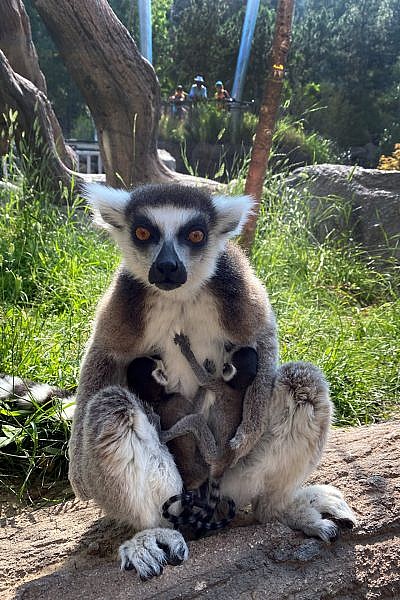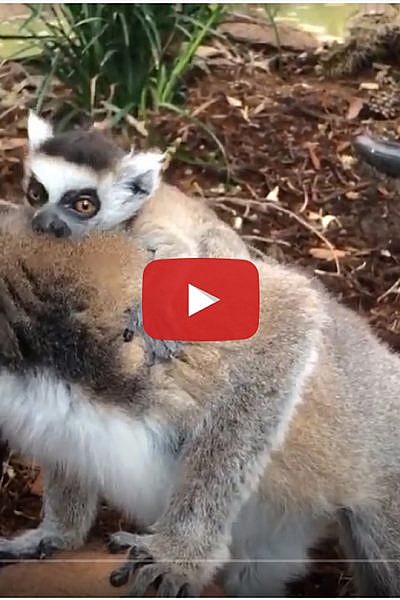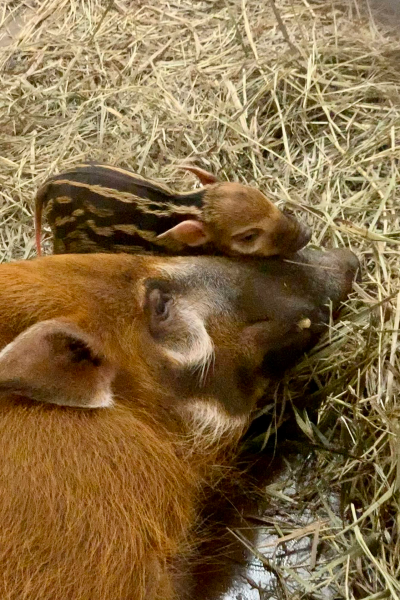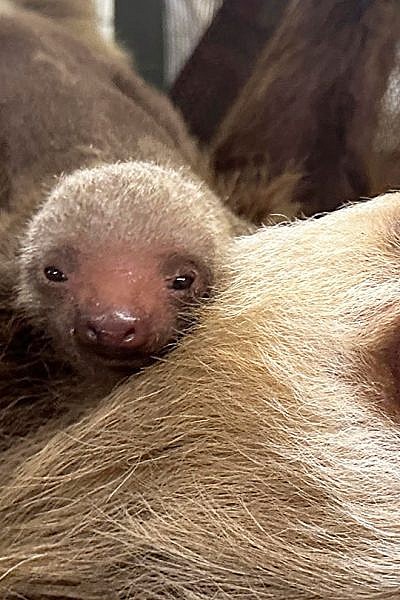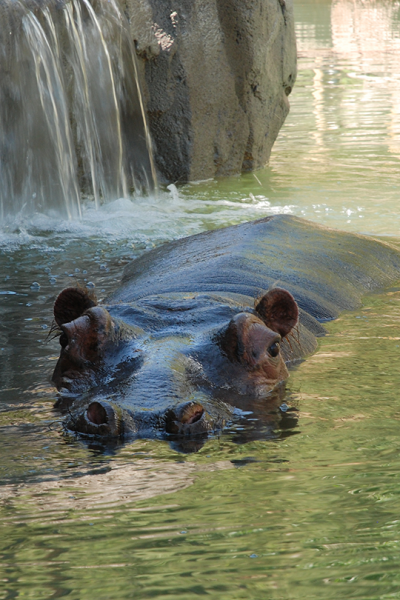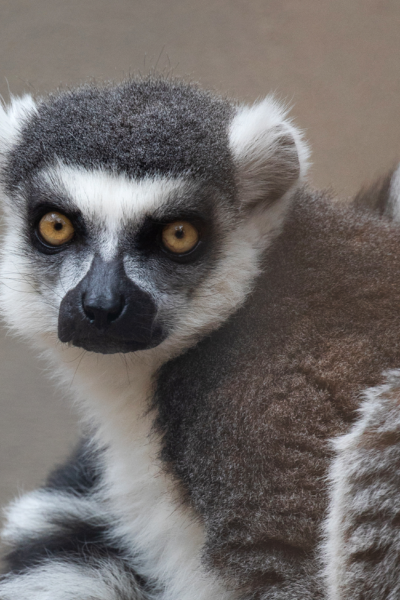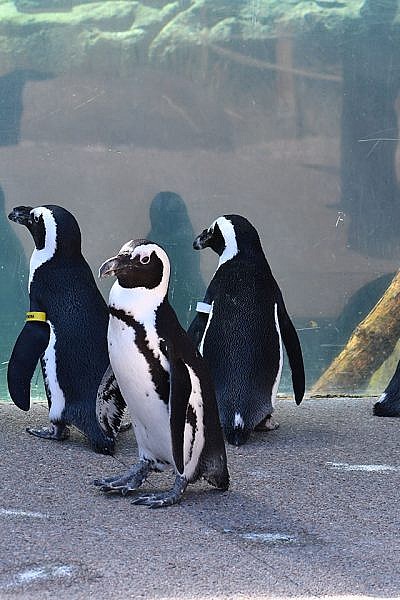SPRING HAS SPRUNG WITH THE ARRIVAL OF A RING-TAILED LEMUR BABY AND A RED RIVER HOGLET – Two first-time animal moms at Cheyenne Mountain Zoo welcomed their babies just in time for Mother’s Day this year! Rogue, a ring-tailed lemur, gave birth on Monday, April 26, and Zena, a Red River hog, welcomed her little piglet on Saturday, April 24. Both moms and babies seem to be bonding and doing well.

Rogue, an 8-year-old ring-tailed lemur, is the proud mom of a fluffy 4-day-old baby, with the same markings as adult lemurs – complete with mini tufted ears and a long black-and-white striped tail. The baby’s sex has not been identified, and likely won’t be for several months. Because mom and baby are doing so well, keepers won’t intervene unless necessary.
The baby is showing signs it’s strong. Keepers say the baby even chooses to cuddle upside-down sometimes, with a firm grip on mom’s chest and stomach, as she moves around. Although lemur fathers don’t typically play an active role in raising their young, 3-year-old dad, Hercules, is curious about his baby. Keepers say Hercules has approached Rogue and the baby, and mom lets dad sniff the baby while she keeps it safe in her arms.
This is the first lemur born at CMZoo in 15 years, and the first baby of any kind born at Water’s Edge: Africa – CMZoo’s new exhibit for hippos, penguins, warthogs, pelicans, lemurs and more. Guests may catch glimpses of the baby on Lemur Island, located in the center of the indoor hippo pool, right away.
“We knew Rogue was expecting, and we are excited to welcome our first Water’s Edge baby to the world,” said Philip Waugh, lead Water’s Edge: Africa keeper. “When we came to work Monday morning, we could see Rogue carrying this tiny little baby around so delicately and being really attentive. It’s been exciting watching the baby, but it’s been even more special watching Rogue embrace this role so naturally. It’s amazing how she just knows what to do.”
Seven-year-old Zena’s keepers say she’s adapting to motherhood well, too. The Red River hog is also a first-time mom who seems to know exactly what to do, even though her 6-day-old youngster looks a lot different than she does. The baby’s sex has not been identified and likely won’t be for another few weeks.
“This is the cutest baby you’ve ever seen in your life,” said Brooke Powell, African Rift Valley keeper and Zena’s primary trainer. “It’s about the size of Zena’s snout, and it’s a beautiful orange-red color with white stripes and spots on its body. It’s so small, but it can move! It’s been super active, running and bouncing around. We love it.”
Zena came to CMZoo on a breeding recommendation with Huey. Thirteen-year-old Huey has been a great father in the past, when he welcomed one offspring in 2015 and three hoglets to CMZoo with his mate, Ari, in 2013. Red River hog fathers, unlike many species, are active in raising their young. For now, while Zena is protective of her little one, they’re giving mom and baby time to bond alone, and will plan to introduce Huey later.
“Zena is an awesome mom” said Powell. “She’s really protective, which is great, and she lets her keepers look at the baby. She makes sure baby is following her wherever she goes, too. They’re really snuggly with each other, and Zena is certainly making sure that little piggy gets plenty to eat.”
Guests won’t see the young Red River hog for at least a few weeks, while Zena and the baby bond together and stay nice and warm indoors. They will start to venture out when Colorado’s weather is a little more predictable.
About Cheyenne Mountain Zoo
Cheyenne Mountain Zoological Society was founded in 1926. Today, Cheyenne Mountain Zoo, America’s mountain Zoo, offers comprehensive education programs, exciting conservation efforts and truly fantastic animal experiences. In 2020, Cheyenne Mountain Zoo was voted #4 Best Zoo in North America and CMZoo’s Rocky Mountain Wild was named #2 Best Zoo Exhibit in North America by USA TODAY 10Best Readers’ Choice Awards. It is Cheyenne Mountain Zoo’s goal to help guests fall in love with animals and nature, and take action to protect them. Of the 233 zoos and aquariums accredited by the Association of Zoos and Aquariums (AZA), Cheyenne Mountain Zoo is one of just a few operating without tax support. Cheyenne Mountain Zoo depends on admissions, membership dues, special event attendance and donations for funding.
